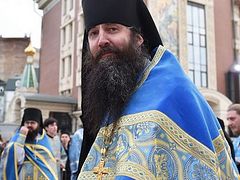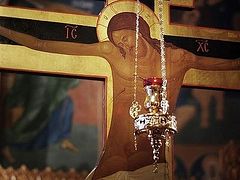Who am I? This is the main question of Great Lent. We try to answer it at the Great Canon, pondering the words of the prayer of St. Ephraim the Syrian, approaching the confessional analogian, and crossing our arms across our chests in anticipation of Communion.
Who am I? We don’t see ourselves. Like a team of horses with blinders on their eyes, leaping ahead without looking back, so we, not looking back, running in a mad dash, trying to find time to do everything—to do everything that concerns our earthly abode. And we have the same blinders as the horses—only we have put them on ourselves. And these blinders don’t allow us to see ourselves and our sinfulness.
But then comes Great Lent and all the blinders fall away. And what do we see?! I am a worm, and no man (Ps. 21:7) it is said so elegantly, intelligently. Perhaps I don’t see myself as a worm. Not every worm is disgusting, but removing the blinders, when we look at ourselves, it’s precisely disgust that we feel.
Who so cleverly said that Lent isn’t about food? Of course it’s not about food! However, non-eating here serves as a kind of contract where you sign up for Great Lenten suffering together with the entire Church Militant. “The arena of the virtues has been opened. Let all who wish to struggle for the prize now enter, girding themselves for the noble contest of the Fast; for those who strive lawfully are justly crowned,”1 the Church sings on the last day before the beginning of Great Lent. Hear: Those “who wish to struggle!”
The entire Church has collectively gotten on the ship and set sail, and observing the external regime of abstinence is but the ticket to the ship. As soon as you get onboard, wonders and woes immediately begin. You can fast according to the fullness of the Typicon or not, but immediately from the beginning of Great Lent, the Lord gives you new states of the heart. What was all of a few days ago, now separated by the border of Forgiveness Sunday, becomes something completely different.
It’s like you were walking in a fog before, and now the fog has dissipated, and the first thing you see is yourself, covered with sores. What you didn’t perceive as a sin just yesterday, today pricks and suffocates you and every empty word crawling out of your mouth begins to judge and crucify you. If yesterday condemnation, anger, and slander were just verbal sins, now every word causes a stench and torments the soul, inasmuch as it reveals all our blackness and madness.
And having just entered the church, you feel like you’ve arrived home. The conflict between the Church and the world is always smoldering, but during Great Lent it flares up exceptionally. It’s not without reason that on the last day before Lent we remember the expulsion of Adam from Paradise: “Banished from the joys of Paradise, Adam sat outside and wept, and beating his hands upon his face he said: ‘I am fallen, in Thy compassion have mercy on me,’”2 the Church sings that day. The wretched Adam, having enjoyed communion with God, suddenly found himself deceived and plundered by the devil, expelled from the Father’s house and weeping bitterly in misery and despair. He saw, felt, and experientially knew the sweetness of Paradise, and therefore he wept: We don’t know it experientially, but only as through a glass darkly; feeling the grace of God, we can only guess at it. And constantly faced with the cruelty of the world, we yearn even more for the lost Paradise, and the church becomes for us like the lost Paradise. Perhaps the initial exclamation of the Liturgy, “Blessed is the Kingdom,” speaks about it too? It speaks to us about the existence of the mysterious Kingdom, breaking through to us by means of the Eucharist, but at the same time it is the longing cry of the sons of Adam, weeping for the lost Paradise…
Great Lent is great in everything. On the first day of Lent, you feel a little bewildered at first. It’s simply amazing how the week before you could easily not eat breakfast and not eat lunch during the work day and only have a quick bite of a sandwich late in the evening and fall into bed, not noticing any particular hunger pangs; then here comes the first Monday of Lent, you haven’t “starved” yet as happens close to Pascha, but the hunger battle has already begun. On other days, you don’t feel like eating anything, and in Lent you’re hungry already in the morning. Moreover, the hunger pangs creep up imperceptibly: You were full and now you suddenly have a mad desire to eat! If you hold out for half an hour, not giving in to the desire, the hunger leaves and you don’t want to eat. A hungry man is always hungry, and here you’re kind of hungry and kind of not. Thus, the supernatural character of hunger becomes known and the actions of the demonic spirit are made manifest.
Battle is the main sign of Lent. Therefore, fasting has nothing in common with a diet. When someone begins to withhold himself for the sake of Christ, he is immediately included in a realty of a different order. And in this reality, everything has meaning and weight.
Every action leads to another. Sin brings admonishment, and podvig—a new trial. In essence, it is a forty-day marathon. Every day throws challenges at you, and responding to them, you learn who you are. The edge of this question cuts us to pieces. Who am I: a wretched, voluptuous beast or a Christian? What can I do for the sake of Christ? How far am I willing to go to please God? We’re not talking about eating absolutely nothing or standing on a rock, but about perfect sobriety and constant vigilance in our hearts.
And no matter how we twist and turn, we can’t get away from the question of prayer. Prayer is the bell of Great Lent. You get up in the morning, and while you’re still drowsy, you begin to slowly ring the language of this bell: “Holy God, Hoy Might, Holy Immortal…” Boom, boom, boom. It’s the toll. The peal is still to come. At first the words are deflected, like peas off a wall, but you persistently try to get through to your own heart and crack its thick armor: “Master, pardon our iniquities, Holy One, visit and heal our infirmities…”
Every “Lord, have mercy” in Lent is special. Every “Lord, have mercy” rebukes and wants to crush you, because the veil has already been removed from your soul, you’ve come out of the fog, and nothing prevents you from seeing your own spiritual inferiority within yourself.
Great Lent is the great destroyer. You can build all sorts of plans before Lent and paint pious pictures for yourself about how you will spend Lent, but then the Forty Days begin and all your plans are destroyed. Perhaps because the Lord doesn’t want the realization of our plans to take us to Heaven on an airplane of pride? Perhaps it’s more pleasing to Him to send our airplane into a tailspin, smashing us and our plans to smithereens, so that the broken parts would cry out all the more: “Lord, have mercy,” but now with tears in our eyes?!
Our minds and our hearts are like a large hotel, with room for everyone and everything. And behind the multitude of heroes from various films, books, and real-life situations, the lone figure of Christ is lost. Therefore, in Lent, we try to limit access to our hearts to anyone as much as possible. During the period of Great Lent, our heart’s hospital is booked full by the Savior. He alone should reign in our minds; to Him alone are offered all the feelings of our heart. In order to evict all the unwanted guests from the hotel, so all the extraneous characters would dissolve into oblivion, we must set a “door of enclosure” around our eyes and ears; so that the storeroom of our heart would be clean for the Lord, we must also “preserve” our mouths, so as not to splatter our inner silence through idle talk.
We often say that Great Lent is a spiritual spring, a time of life. But Christianity insists that life can only fully come into its own after death. Orthodoxy says that Pascha is the genuine life, shining forth from the tomb. Therefore, we must draw the inevitable conclusion that Great Lent is a time of death. To die to sin is the final goal of Lent, and generally of our entire lives.
There’s no need to object, banishing asceticism from the world to monasteries! There is asceticism in the world, even of a non-Christian character. After all, we delight in the achievements of athletes or the skill of musicians who spend many hours killing themselves to everything that is contrary to their main goal in life. Six hours of training every day—is that not asceticism? And the torments of creating a work of art, when a writer or artist doesn’t sleep all night long, is that so far from monastic vigils when the gift of the grace of the Holy Spirit is born in the heart of a venerable father through torments?
There should be asceticism in the world—otherwise our Christianity degenerates into jelly, into Protestantism, into Pharisaism. Asceticism is not only and not so much abstinence from all the types of non-fasting food. It’s an endless study of the heart, the expulsion of sinful thoughts, and a constant “walking before the Lord.” It’s a work that requires unceasing repentance, and, according to the words of one man of prayer, this unceasing repentance gives birth to unceasing prayer. “Repentance gives birth to prayer, and is in turn born of its daughter a hundredfold.” These words, the slogan of Great Lent, are inscribed by the wise hand of St. Ignatius (Brianchaninov).
This work is hated by the devil, and in the end is rejected by all modern people who ease their Lenten practice, because this work is impossible to take up without abstinence and prayer. Constantly following along the path of repentant prayer is the ascetic death of a Christian, confining himself within the tomb of the heart with hope in the Paschal resurrection.
Therefore, we can say that Great Lent is a great trial. And if someone passes through it worthily, then he becomes great.
Great Lent compresses our entire Christian life into seven weeks, like a spring. And if we can’t live like a Christian even in Great Lent, then how do we live in ordinary times?! If we can’t attentively pray even in Great Lent, and abstain and be vigilant, then how do we pray and what are we thinking about on ordinary days?
Do not pass up this saving time, brothers and sisters! It is short. The spring won’t be compressed for long. Labor, be sober, pray at any time. Expel your sins from yourself. Christ’s Pascha is coming, which enlightens and blesses those who are prepared.





